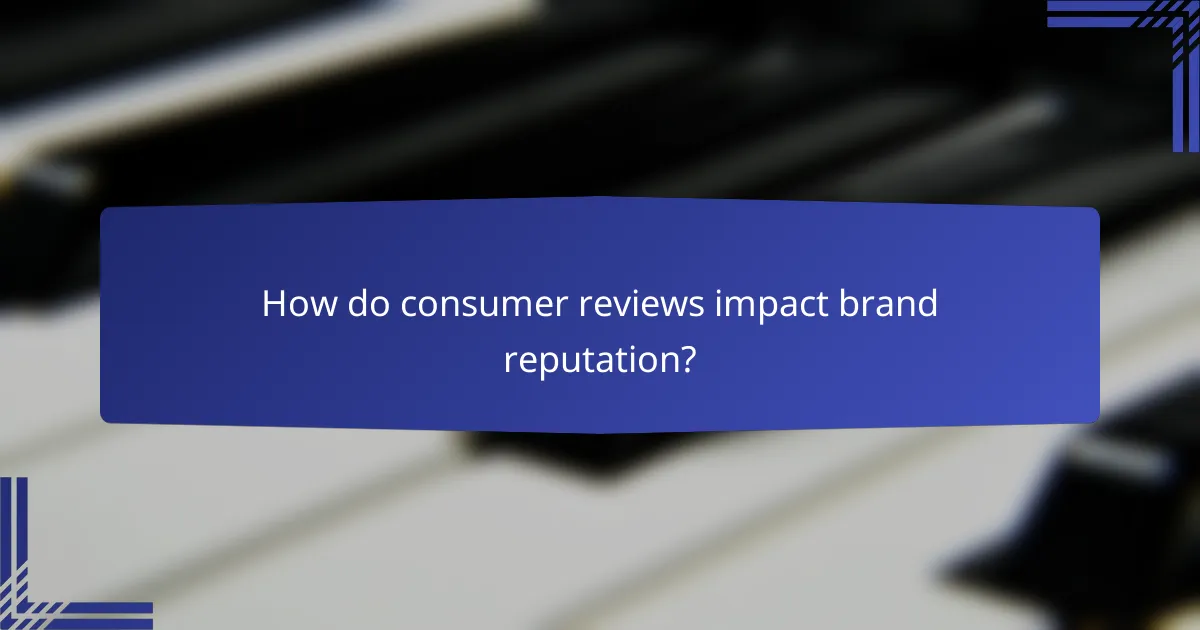Brand reputation plays a crucial role in determining instrument quality and consumer trust. A strong reputation not only sets high expectations for product performance but also encourages manufacturers to maintain rigorous quality control standards. Conversely, a poor reputation can result in diminished trust and lower product quality, impacting purchasing decisions and long-term success in the market.

How does brand reputation affect instrument quality?
Brand reputation significantly influences instrument quality by establishing consumer expectations and driving manufacturers to adhere to higher standards. A strong reputation often correlates with rigorous quality control processes, while a poor reputation can lead to lax standards and inferior products.
Positive reputation leads to higher quality standards
A positive brand reputation encourages manufacturers to maintain high quality standards to meet consumer expectations. Companies with a strong reputation often invest in advanced materials and technologies, ensuring their instruments perform reliably and last longer.
For example, brands known for their precision instruments may implement strict testing protocols and certifications, such as ISO standards, to guarantee product excellence. This commitment to quality not only satisfies existing customers but also attracts new ones, reinforcing the brand’s reputation.
Negative reputation results in reduced trust
A negative reputation can severely undermine consumer trust, leading to skepticism about the quality of instruments produced by that brand. When customers perceive a brand as unreliable, they are less likely to purchase its products, which can create a vicious cycle of declining sales and further quality issues.
For instance, if a brand is associated with frequent product failures or safety concerns, potential buyers may opt for competitors, even if they are more expensive. To regain trust, brands must invest in quality improvements and transparent communication about their efforts to rectify past mistakes.

What role does brand reputation play in consumer trust?
Brand reputation significantly influences consumer trust by shaping perceptions of quality and reliability. A strong reputation often leads to increased confidence in purchasing decisions, while a poor reputation can deter potential customers.
Established brands foster greater consumer confidence
Established brands typically enjoy higher levels of consumer confidence due to their proven track records and consistent product quality. For instance, brands with a long history in the market often have established customer loyalty and positive reviews that reinforce trust.
Consumers are more likely to choose well-known brands over lesser-known ones, especially for high-value purchases. This is because established brands often have the resources to invest in quality control and customer service, further enhancing their reputation.
New brands struggle to gain trust without reputation
New brands face significant challenges in building consumer trust due to their lack of established reputation. Without prior customer experiences or reviews, potential buyers may hesitate to invest in their products, fearing lower quality or reliability.
To overcome this hurdle, new brands can focus on transparency, customer engagement, and leveraging social proof, such as testimonials or endorsements. Offering guarantees or trial periods can also help mitigate perceived risks and encourage first-time purchases.

How can brands improve their reputation in the instrument market?
Brands can enhance their reputation in the instrument market by focusing on quality assurance and actively engaging with their customers. Building trust through consistent product performance and transparent communication is essential for long-term success.
Implementing quality control measures
Quality control measures are critical for brands looking to establish a strong reputation in the instrument market. These measures can include regular inspections, adherence to industry standards, and rigorous testing protocols to ensure that products meet specified performance criteria.
Brands should consider implementing a multi-tiered quality assurance process that involves both in-house testing and third-party evaluations. This approach not only helps in identifying defects early but also provides credibility when communicating quality claims to customers.
Engaging with customer feedback
Actively engaging with customer feedback is vital for brands aiming to improve their reputation. This can be achieved through surveys, online reviews, and direct communication channels that allow customers to share their experiences and suggestions.
Brands should prioritize responding to feedback, both positive and negative, to demonstrate their commitment to customer satisfaction. Regularly analyzing feedback trends can also help identify areas for improvement and inform product development strategies, ultimately enhancing trust and loyalty among consumers.

What are the key factors influencing brand reputation?
Brand reputation is shaped by several critical factors, including product quality, customer service, and overall performance. These elements collectively impact consumer trust and loyalty, ultimately influencing purchasing decisions.
Product quality and performance
Product quality and performance are fundamental to establishing a strong brand reputation. High-quality products that consistently meet or exceed customer expectations foster trust and encourage repeat purchases. For instance, brands known for durability and reliability, such as Apple or Bosch, often enjoy a loyal customer base.
To assess product quality, consider customer reviews, industry ratings, and warranty offerings. A product with a robust warranty often indicates confidence in its quality. Additionally, brands that adhere to recognized standards, such as ISO certifications, can enhance their reputation through demonstrated commitment to quality.
Customer service and support
Customer service and support play a vital role in shaping brand reputation. Effective customer service can turn a negative experience into a positive one, reinforcing trust and loyalty. Brands that provide timely, helpful support, such as Zappos, often receive high praise and repeat business.
To improve customer service, companies should focus on responsiveness, accessibility, and resolution effectiveness. Offering multiple channels for support—such as phone, email, and live chat—can cater to diverse customer preferences. Regular training for support staff can also ensure they are equipped to handle inquiries efficiently and empathetically.

How do consumer reviews impact brand reputation?
Consumer reviews significantly influence brand reputation by shaping public perception and trust. Positive feedback can enhance a brand’s image, while negative comments may lead to skepticism among potential customers.
Positive reviews enhance brand image
Positive reviews contribute to a stronger brand image by showcasing customer satisfaction and product quality. When consumers share their favorable experiences, it builds credibility and encourages others to consider the brand. For instance, a brand with a high rating on platforms like Trustpilot or Google Reviews can attract more buyers.
Brands can leverage positive reviews by featuring them in marketing materials or on their websites. Highlighting testimonials from satisfied customers can create a sense of community and trust, making potential buyers feel more confident in their purchasing decisions.
Negative reviews can deter potential buyers
Negative reviews can significantly harm a brand’s reputation by raising doubts about product quality and customer service. A few critical comments can overshadow numerous positive ones, especially if they highlight recurring issues. For example, if a brand receives consistent complaints about durability, potential customers may hesitate to make a purchase.
To mitigate the impact of negative reviews, brands should actively engage with dissatisfied customers, addressing their concerns and offering solutions. This proactive approach can demonstrate commitment to customer satisfaction and may even turn a negative experience into a positive one, ultimately helping to restore trust in the brand.

What are the consequences of a damaged brand reputation?
A damaged brand reputation can lead to significant negative impacts on a company’s performance, including loss of customer trust and decreased sales. When consumers perceive a brand negatively, they are less likely to purchase its products or recommend them to others.
Loss of market share
When a brand’s reputation suffers, it often results in a loss of market share as competitors capitalize on the opportunity. Customers may switch to alternative brands that they perceive as more trustworthy or reliable. This shift can lead to a decline in sales and revenue, making it crucial for companies to actively manage their reputation.
For example, a company that faces public scrutiny due to poor product quality may see its market share drop by tens of percent as consumers flock to competitors. To mitigate this risk, brands should regularly monitor public perception and address any issues promptly.
Increased customer churn
A damaged reputation can significantly increase customer churn, as dissatisfied customers are more likely to abandon a brand for better options. This turnover can be costly, as acquiring new customers typically requires more resources than retaining existing ones.
To combat increased churn, companies should focus on improving customer service and addressing complaints swiftly. Implementing loyalty programs and soliciting feedback can also help rebuild trust and encourage customers to remain loyal, even in the face of reputational challenges.

How do brands in the instrument industry manage their reputation?
Brands in the instrument industry manage their reputation through consistent monitoring of their online presence and implementing proactive public relations strategies. These practices help them maintain trust and ensure high-quality perceptions among consumers.
Regular monitoring of online presence
Regular monitoring of online presence involves tracking brand mentions across various platforms, including social media, forums, and review sites. This allows brands to quickly identify and address any negative feedback or misinformation that could harm their reputation.
Companies often use tools like Google Alerts or social media listening software to stay updated on public sentiment. By responding promptly to customer inquiries and complaints, brands can demonstrate their commitment to quality and customer satisfaction.
Proactive public relations strategies
Proactive public relations strategies include engaging with the audience through press releases, media outreach, and community involvement. Brands often host events or sponsor local initiatives to build positive associations and enhance their public image.
Additionally, maintaining relationships with industry influencers can amplify a brand’s message and credibility. By showcasing product quality through endorsements or testimonials, brands can further solidify trust among potential customers.

What are the emerging trends in brand reputation management?
Emerging trends in brand reputation management focus on transparency, authenticity, and proactive engagement. Companies are increasingly leveraging social media and data analytics to monitor public perception and respond swiftly to feedback.
Increased focus on transparency
Transparency has become a critical element in brand reputation management. Consumers expect brands to be open about their practices, values, and supply chains. This trend encourages companies to share information about their sourcing, production processes, and corporate social responsibility initiatives.
For example, brands that provide detailed insights into their sustainability efforts often gain consumer trust and loyalty. Companies should consider publishing sustainability reports or engaging in third-party audits to enhance their credibility.
Leveraging social media for reputation monitoring
Social media platforms are vital for monitoring brand reputation in real-time. Brands can track mentions, comments, and reviews to gauge public sentiment and address concerns promptly. Utilizing tools like sentiment analysis can help identify trends and potential issues before they escalate.
For effective monitoring, companies should establish a dedicated team to manage social media interactions and respond to customer inquiries. Regularly analyzing feedback can inform product improvements and customer service strategies.
Emphasis on customer engagement and feedback
Engaging with customers directly is increasingly important for maintaining a positive brand reputation. Brands that actively seek and respond to customer feedback demonstrate that they value their audience’s opinions. This can be achieved through surveys, focus groups, or interactive social media campaigns.
Encouraging user-generated content and testimonials can also enhance brand credibility. Companies should consider creating platforms for customers to share their experiences, which can foster community and trust.
